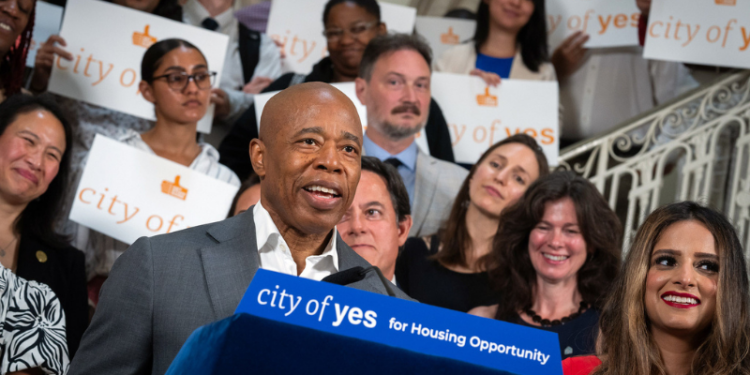New York City Mayor Eric Adams and Governor Kathy Hochul announced the advancement of the “City of Yes for Housing Opportunity” plan on Thursday, November 21st, a landmark zoning reform aimed at addressing New York’s housing crisis. The plan, approved by the City Council’s zoning committees, is expected to create 80,000 new homes over the next 15 years, backed by a $5 billion investment in housing and infrastructure.
Mayor Adams highlighted the plan’s transformative potential: “Everyday New Yorkers have carried the burden of a generational housing crisis for far too long. Thanks to our shared commitment, we have reached an agreement on a historic plan that could open the doors to a little more housing in every neighborhood.” He urged the City Council to unite behind the proposal, emphasizing its importance for affordability across all boroughs.
Governor Hochul echoed this sentiment, stressing the urgency of housing development: “New York has a housing affordability crisis, and there’s only one way out: build more housing. I’m proud to stand with Mayor Adams and other leaders in moving forward with this plan to make New York more affordable for all of us.” Hochul announced a $1 billion state commitment to support affordable housing, underscoring the collaboration between state and city governments.
The “City of Yes” plan introduces major zoning changes, including reduced parking mandates, transit-oriented development, and allowances for accessory dwelling units (ADUs). While compromises were made to secure council approval, such as limiting ADU construction in flood-prone areas and scaling back parking mandate eliminations, the core provisions remain intact. These changes aim to promote housing growth while addressing community concerns.
Critics voiced disappointment over the compromises, citing reduced housing potential and continued car dependence in transit-rich areas. However, housing advocates celebrated the progress. Rachel Fee of the New York Housing Conference called it “the most comprehensive effort to increase supply in decades,” while others noted the plan’s potential to inspire future reforms.
The plan also includes a $2 billion investment in infrastructure and $1 billion for tenant protections and neighborhood planning. As it awaits final City Council approval on December 5th, the “City of Yes” reflects a significant political victory for Mayor Adams, solidifying his commitment to tackling the housing crisis head-on.









